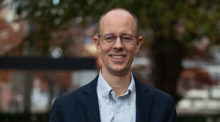Munk School staff
As Freetown, the capital of Sierra Leone, began its coronavirus lockdown in early April, Mayor Yvonne Aki-Sawyerr and the Freetown City Council rolled out at a new property tax system. The goal: to would dramatically increase property tax collection, particularly from the rich, with the aim of quintupling the city’s tax revenue while also making the system more equitable. The plan was almost delayed due to the ongoing pandemic, but Mayor Aki-Sawyerr decided to move forward, opting to focus initially on the most valuable properties, using contactless tax bills and payments, in order to raise urgently needed revenues to provide relief to more vulnerable populations. The reform program has since been featured in The Economist, among other prominent outlets.
For Wilson Prichard, an associate professor in the Munk School’s Master of Global Affairs (MGA) program who co-led the property tax reform initiative with Freetown’s municipal government, taxation is one of the foundations of citizenship and state-building, and plays a critical role in building equality.
Prichard is the CEO of the International Center for Tax and Development (ICTD), a global policy research center and network that aims to improve the effectiveness, equity and accountability of tax policy and administration in developing countries, particularly in sub-Saharan Africa.
He and the ICTD team have done pioneering research work and policy engagement focused on new approaches to taxing high net worth individuals, strategies for strengthening international tax reform, reducing tax burdens on the poor, addressing gender inequalities in tax administration, among other topics. They have also been leaders in building new models for research partnerships with revenues administrations in sub-Saharan Africa.
“In many ways, raising taxes is the most fundamental activity of any state. It is how states are able to pay for security, for goods and services, and for the broad governance demanded by citizens,” says Prichard.
“More often overlooked is that taxation is, in many respects, the foundation of the social contracts between citizens and governments: an implicit agreement about what, how, and why everyone should contribute to the public good, and about what they should get in return.”
Prichard’s most recent, co-authored, book, Taxing Africa: Coercion, Reform and Development, offers an expert introduction to the issues of taxation in Africa while also examining the potential for reform. It was named one of the Best Books of 2019 by Foreign Affairs, an American international relations and foreign policy magazine.
As more policymakers demand high quality research in the field of taxation and development, the ICTD is expanding to meet those needs. The core team that has grown from five to thirty-one around the world over the past decade, including five staff based at UofT. The ICTD team includes four Munk School alumni (Rhiannon McCluskey, Moyo Arewa, Vanessa van den Boogaard, Soukayna Remmal), and one current MGA student (Ruvimbo Chidziva), while two other MGA grads started their careers with the ICTD after graduation (Fariya Mohiuddin and Kailee Jordan).
McCluskey (who joined from the Munk School’s Peace, Conflict and Justice program) leads the communications and research uptake team for the ICTD. Arewa (an MGA grad) is currently a program and research officer, responsible for supporting the management and implementation of the ICTD’s research and capacity building programs – and for expanding ICTD’s team and programs based at UofT. Van den Boogaard (also an MGA) leads the ICTD’s new program on civil society engagement in tax reform and co-leads the research programs on informal taxation and on tax and gender. Remmal (another MGA) is a research and communications officer, supporting French language communications and capacity building, and new research on the Zakat in Morocco, Egypt and Pakistan. Chidziva (MGA) is supporting collaboration with, and capacity building for, civil society. Mohiuddin is now senior program officer for Tax Equity at the International Budget Partnership, while Jordan is a project coordinator at Médecins Sans Frontières.
“With enhanced ICTD staffing at the Munk School,” says Prichard, “one of our central ambitions is to increase our engagement with our graduate students through a combination of teaching, events, internships, and other opportunities to engage with ICTD partners throughout the year.”
The new tax system in Freetown began implementation on June 1 and is the product of research dating back almost ten years, offering a unique opportunity to translate research ideas into concrete policy and administrative innovation. Prichard hopes that “it will serve as a source of inspiration to reform elsewhere in the continent.”
July 10, 2020
